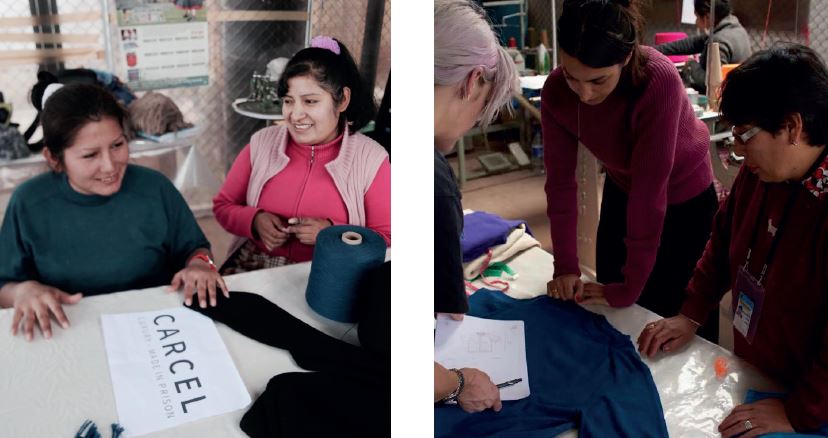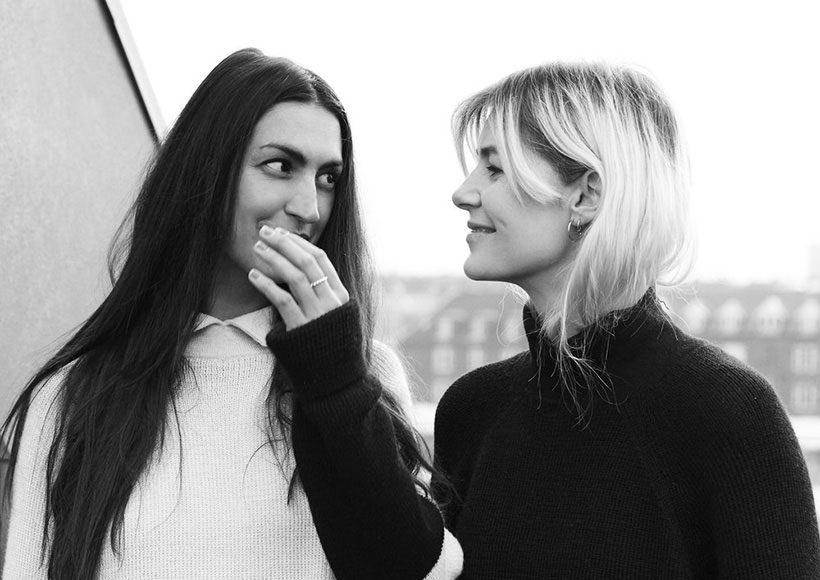// Interview: Veronica D’Souza
CARCEL’s founder and CEO
JT: What is CARCEL and how did this business idea start?
VS: CARCEL is a clothing label made by women in prison in different parts of the world using 100% natural materials and Danish design.
I had this idea after visiting a prison in Kenya and saw, first-hand, how imprisoned women were already producing textiles in order to stay busy for 8 hours a day – but without access to good materials, designs or a market to sell to, they could not make any proper money from their labour.
All over the world, hundreds of thousands of women are imprisoned due to non-violent crimes, because of drug trafficking, theft or prostitution. The main cause of female incarceration in developing countries is poverty.
I started CARCEL in order to use the resources that are already there, machines, time, people, skills etc, and transform otherwise lost years into new skills and good wages. The goal is that these women can cover basic living costs, send their children to school, save up for a crime-free new beginning, and ultimately break the spiral of poverty.
JT: Please tell us about the business model and what is different about it.
VS: CARCEL casts a new angle on the production of women’s luxury fashion and we do it in a truly innovative and creative way, as we balance the sale of luxury fashion with improving the living conditions of women in prison and their families, in the best possible way.
Our project intends to disrupt the fast fashion industry by not having any traditional seasons. Instead, we train the women in new styles and launch them when they are and we are ready. This is possible because we sell exclusively online through our own platform, so we decide the pace.
This way, we can ensure optimal training and the optimal quality of every piece. We go where the highest quality materials meet the highest rates of poverty-related female incarceration, paying women fair wages to make designs from locally and sustainably sourced materials; no chemicals are used and very little water and dye are needed.
Since we’re working with natural fibres, they’re completely biodegradable. At the same time, we keep consumer prices down by cutting the luxury markup by only selling online. Our first collection consists of simple-yet-chic knitwear made from 100% baby alpaca wool, manufactured by women in Cusco’s women’s prison, in Peru.
JT: What led you to Peru and this country’s prisons, in the first place?
VS: The number of women in prison in Peru has practically doubled in the last 15 years, with many behind bars for committing poverty-related crimes, particularly drug trafficking.
Furthermore, Peru has a long tradition for alpaca and knitwear, so we use the fantastic expertise of these women and turn otherwise wasted time into skills and paid jobs, so that incarcerated women can support themselves and their children.
Alpaca wool is an exclusive and sustainable material that makes beautiful garments that will last a long time.

JT: How do you envision the imprisoned women that work with CARCEL?
VS: We see CARCEL’s employees with the utmost respect, we trust them and we rely on their professional skills. The basis for CARCEL is to empower the women to engage in the production of high-quality fashion items for an international market, and make the best for all the stakeholders involved in the project, hence us, women, partners and customers.
Many of those deprived of freedom women have children to support and are in prison in the first place because of poverty, with low educational levels. They are extremely dedicated to learning and motivated to do their best and gain dignity and pride by having something to send home to their families.
We see an incredible potential in the women that work with us and we are sure that they are and will be better off, because they’re not only making a living but they’re also acquiring skills and work habits that will both foster their financial independence and contribute to a law-abiding new life as soon as each one of them is freed.
JT: Which main obstacles were there along the way?
VS: Setting-up a production inside a prison means no email or phone contact. This is challenging and requires good trustworthy relations that can operate on the ground. Furthermore, the prison is not set up with the purpose to be run as a factory.
Even though the facilities are there, there are a lot of other activities during the day that must be respected and counted into the work schedule such as visits from relatives, visits from NGOs and religious institutions, events, meetings with prison officials etc.
And furthermore, it is common that many women suffer from depressions and get very affected by any event taking place on the outside related to their relatives. This means that, often, the women cannot work a full eight hours a day, and it is necessary to create a payment system that remunerates them per item rather than per hour so we can also include those who might not be able to work as much.
These variables can be seen as challenges but I also believe that this is what pushes the production set up to be unique as we need to invent new ways of running a production in order to make it optimal for the women, the prison system and the business of a fashion label.
JT: To what extent is this project making a difference in the lives of the women who are involved in it?
VS: Women are very pleased to have the opportunity to work and make a living, which can benefit both themselves and their families for good.
It makes them pride to work on quality garments that will be sold worldwide and they really dedicate themselves to do a meticulous and careful production.
They put their heart into it. They have all said that working is the best part about prison, because it keeps the thoughts off how much they miss their family, and it makes times fly much faster.
JT: What benefits do you picture for the prison system?
VS: The prison system is already doing a lot in terms of vocational training and motivation. We come in and complement their work and turn the input into a productive output. In that sense, it’s a great partnership that plays into the core mission of the prison.
By having motivated and happier prisoners, you get better safety, which means a better environment for the employees who then have more energy and time to focus on rehabilitation, which again leads to better lives for the inmates.
It’s about adding to the positive spiral that can lead to the best possible outcome for the inmate and her release. Our partnership with the prison system in Peru is fantastic and they are keen as well to innovate and see how they can learn from this process. It’s the first time that they cooperate with an international company.
JT: Is there more to this business than fair trade?
VS: We believe that customers are ready to buy nice clothes, which also solves the problems of the world, instead of creating more… So I’d say that yes, our project goes far beyond just fair trade.
Let me remark that both fashion and the textile industry are, generally, very polluting industries, second only to the oil industry. So, it’s very hard for the end-consumer to grasp the environmental and social footprint of their purchases and we certainly do not think that the future must be characterised by bad conscience and morality.
Instead, we are developing great alternatives with sumptuous designs that overflow quality both in expression and in their journey through the world. It is the future that we believe in and work towards, without compromising none of these elements of the equation: design, quality, planet and people.
JT: How do you expect your business to develop and unfold in the short run? Are there other countries you consider producing in?
VS: Our mission is global. We aim to go where we believe we can make an impact through the production of beautiful products in natural materials. We are currently investigating the potential of setting up a production in women’s prisons in Thailand.
I am just now at the end of a three weeks research trip where we visited prisons all over the country. We have been warmly welcomed by the department of corrections and are discussing a potential model for setting up a partnership.
Thailand has a fantastic tradition for making beautiful silk, an expertise run by women for generations. At the same time, Thailand ranks number 6 on the list of countries with most prisoners per habitant. 80 – 90% of women are in for drug related crimes.
We are also investigating other countries and welcome any suggestions and invitations from prisons that might be interested in a cooperation.
//
Veronica D’Souza is a Danish social entrepreneur. Besides being the founder and CEO of CARCEL, she’s also co-founder of the Ruby Cup and member of the Global Shapers Community. She holds a master degree in International Business and Politics and a minor in Sustainable Business from the Copenhagen Business School.


